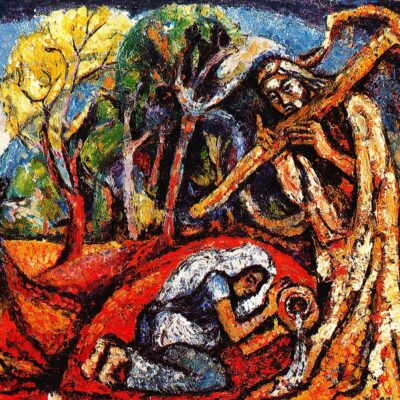I once heard a wedding sermon that made a big deal out of the difference between a contract and a covenant. I guess the young preacher was acutely aware that the couple were both just finishing law school!
Like that couple, most of us are more familiar with contracts than with covenants. We enter into them all the time, usually by pressing “agree” online after not reading the 3 pages of terms for the service we’ve signed up for! We have employment contracts and real estate contracts and service provider contracts. They define and delineate our lives.
We have contracts in church too. We share our buildings with a number of different groups and ministries. Each one enters into a contract with us and our larger body, the Diocese. When we were considering partnering with our sister church, Pangea, we negotiated a contract, got the proper documents in order and signed on the dotted line. But we did something in addition to the contract.
We wanted to develop guidelines about how we would relate to one another. We knew that the relationship could be life-giving and precious or it could become frustrating and conflicted. So we decided to enter into a covenant with one another.
We shared what was important to us and what values would guide our partnership. Each partner promised to be available to the other to work out the normal tensions that come up when you’re sharing space. We asked hard questions and listened deeply. And we agreed to adjust the covenant as needs or situations changed.
We rarely look at the contract. Usually the relationship is already in deep trouble if you have to start quoting the fine print. Instead we check in with one another regularly and remind ourselves of what matters most to the other by recalling what we have promised in our covenant.
God is a covenant-making deity. From the very beginning God makes promises to the people he has created and loves so dearly. His covenant with Abram and Sarai is dramatic. In an ancient ritual only documented one other time in the Bible, God literally “cuts a covenant” with Abram, sealing his promise forever in blood and with an oath that only death can sever. God asks Abram to cut three animals in half, laying them out on the ground.
All day Abram sits beside their carcasses, chasing off the vultures and carrion birds, smelling the increasing decay as he contemplates the mysterious interiors of what were once living beings. Finally he swoons in sleep, filled with anxiety and foreboding. In the deep darkness of the night, when nothing is visible, a blazing fire, the fire of God appears and passes between the halves of the animals, and God makes a solemn oath to be faithful to his promise.
How do we moderns make sense of this ancient rite? The closest we come to this experience is when two children prick their thumbs and mingle their blood in the oath of blood brothers, thereby sealing a promise to be faithful to each other no matter what. How can God’s presence in fire passing through dismembered animals symbolize God’s willingness to be bound to Abram and to share his fate?
We may not understand it but Abram and his ancestors certainly did. These signs and symbols carried deep meaning for them. The promises God makes to give them both land and descendants carries Abram and Sarai through a long journey, through years of barrenness and doubt and into the fulfillment of the promise beyond their wildest imaginings. God makes the covenant and keeps it even when Abram loses hope and tries to get an heir from his concubine. God remains faithful even when an elderly Sarai scoffs when the angel of God gives her the news that she is to bear a child.
God makes covenants with Noah, Moses, Abraham, David and they all have the same thing in common. In every case the human partner lets down their end. Noah gets drunk. Moses’s brother Aaron helps the people build a golden idol. Abraham loses trust in God and tries to pass Sarah off as his sister. David commits adultery and murder. We humans are fickle and weak and forgetful. We get impatient and angry and depressed. We let ourselves and our loved ones down. And over and over again, we let God down.
But here’s the difference. God remains faithful. God keeps promises. God renegotiates. God never gives up and is willing to go to any lengths to be in relationship with us. God’s ultimate covenant comes to us in Jesus Christ. Jesus is the one who sees us frightened and scattered and helpless like little chicks. He knows the ways we have forsaken God and gotten lost and afraid. And like a mother hen, he longs to draw us back to God and to protect us.
Jesus makes the ultimate covenant with us in his own blood. He offers all for the sake of a real and lasting relationship with hurting and damaged humanity. He can transform our shame and humiliation, our failures and wounds. It is by his grace and glory that we are made new, forgiven, redeemed, and claimed as God’s beloved. The covenant God makes with us is not dependent on our ability to keep its terms. It depends solely on God’s power, faithfulness and mercy.
To mark God’s grace and the power of God’s love we participate in sacraments–outward and visible signs of inward spiritual grace. We have our rituals, our signs and symbols of the covenant. The two primary ones for Christians are baptism and Eucharist; the bath and the table; water, bread and wine. And they can be just as strange and shocking as Abram’s animal sacrifices.
To be immersed in the waters of baptism is to be called God’s beloved. Baptism confers a heavenly citizenship. In baptism we enter into the death and resurrection of Jesus and our lives are linked to him in a profound way. We are sealed by the Holy Spirit and marked as Christ’s own forever.
At baptism we enter into a covenant with God. It’s not dependent on us. We don’t have to have full comprehension of what it means to be God’s beloved. We don’t have to be at the age of reason. We don’t have to be perfect. We don’t have to wait until we’re so close to death that we aren’t capable of committing any more sins so we can die “in a state of grace.” We don’t have to be able to keep up our end of the bargain. We don’t even have to have perfect faith or constant belief.
Yes, there are promises we make or are made on our behalf when we are baptized. They are important touchstones for how we want to be in relationship with God and with others. They remind us what it means to live as a beloved child. They bring us back to our better selves when we have strayed. And we will stray. And when we do the Good Shepherd of the sheep will seek us out and call us back to safety and to our best and truest selves.
This Lent many of us are making a “Spiritual Pilgrimage” by exploring the promises in the baptismal covenant. It is an opportunity to enter more deeply into the covenant God makes with us, to live into who God longs for us to be. We are guaranteed to mess it up, to make mistakes, to forget what we intended to do or be. Yet God in Christ is faithful. God never abandons us or forgets the promise God has made to be with us even to the end.
This is a covenant you can count on.
With faith, hope and love,
Canon Britt Olson





